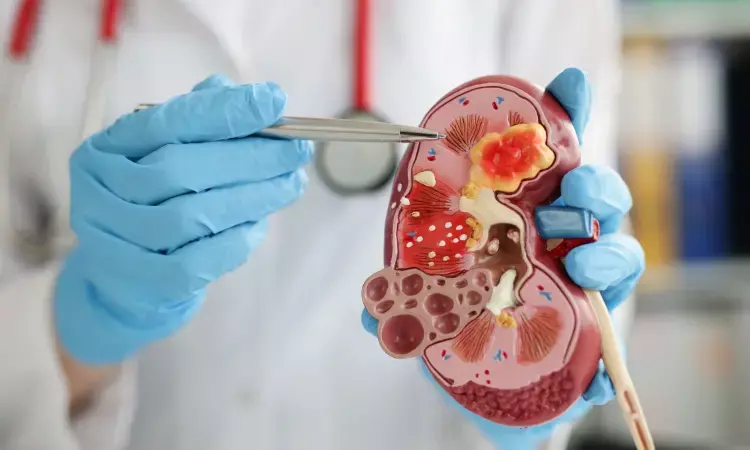- Home
- Medical news & Guidelines
- Anesthesiology
- Cardiology and CTVS
- Critical Care
- Dentistry
- Dermatology
- Diabetes and Endocrinology
- ENT
- Gastroenterology
- Medicine
- Nephrology
- Neurology
- Obstretics-Gynaecology
- Oncology
- Ophthalmology
- Orthopaedics
- Pediatrics-Neonatology
- Psychiatry
- Pulmonology
- Radiology
- Surgery
- Urology
- Laboratory Medicine
- Diet
- Nursing
- Paramedical
- Physiotherapy
- Health news
- Fact Check
- Bone Health Fact Check
- Brain Health Fact Check
- Cancer Related Fact Check
- Child Care Fact Check
- Dental and oral health fact check
- Diabetes and metabolic health fact check
- Diet and Nutrition Fact Check
- Eye and ENT Care Fact Check
- Fitness fact check
- Gut health fact check
- Heart health fact check
- Kidney health fact check
- Medical education fact check
- Men's health fact check
- Respiratory fact check
- Skin and hair care fact check
- Vaccine and Immunization fact check
- Women's health fact check
- AYUSH
- State News
- Andaman and Nicobar Islands
- Andhra Pradesh
- Arunachal Pradesh
- Assam
- Bihar
- Chandigarh
- Chattisgarh
- Dadra and Nagar Haveli
- Daman and Diu
- Delhi
- Goa
- Gujarat
- Haryana
- Himachal Pradesh
- Jammu & Kashmir
- Jharkhand
- Karnataka
- Kerala
- Ladakh
- Lakshadweep
- Madhya Pradesh
- Maharashtra
- Manipur
- Meghalaya
- Mizoram
- Nagaland
- Odisha
- Puducherry
- Punjab
- Rajasthan
- Sikkim
- Tamil Nadu
- Telangana
- Tripura
- Uttar Pradesh
- Uttrakhand
- West Bengal
- Medical Education
- Industry
SGLT2 inhibitors improve kidney and cardiac outcomes in patients with SLE and type 2 diabetes: JAMA

Taiwan: In a significant stride towards understanding and potentially managing nephritis in patients with systemic lupus erythematosus (SLE), a recent study has shed light on the promising role of Sodium-Glucose Cotransporter-2 (SGLT2) inhibitors. This revelation marks a potential breakthrough in the treatment landscape for SLE-associated nephritis.
In the multicenter cohort study of 1775 matched pairs of SGLT2i users and nonusers with SLE and type 2 diabetes, SGLT2is use was associated with improved cardiac and kidney outcomes.
"The use of SGLT2 inhibitors was associated with a significantly reduced risk of dialysis, lupus nephritis, heart failure, kidney transplant, and all-cause mortality compared with no SGLT2i use," the researchers reported in JAMA Network Open.
Systemic lupus erythematosus, a chronic autoimmune disease, affects various organs and tissues, including the kidneys. Nephritis, inflammation of the kidneys, is a common and debilitating complication of SLE, often leading to renal failure and significant morbidity and mortality among patients. Despite advancements in treatment, managing nephritis in SLE remains a clinical challenge.
SGLT2 inhibitors, initially developed for managing diabetes mellitus, have recently garnered attention for their potential therapeutic benefits beyond glycemic control. These drugs act by inhibiting glucose reabsorption in the kidneys, thereby promoting glycosuria and natriuresis. Beyond their antidiabetic effects, SGLT2 inhibitors have demonstrated renal protective properties in various conditions, including diabetic nephropathy and heart failure.
Against the above background, Fu-Shun Yen, Dr Yen’s Clinic, Taoyuan, Taiwan, and colleagues aimed to investigate whether SGLT2is use is associated with the onset and progression of lupus nephritis and other cardiac and kidney outcomes in patients with SLE and type 2 diabetes.
For this purpose, the researchers conducted a multicenter cohort study using the US Collaborative Network of the TriNetX clinical data platform to identify patients with SLE and type 2 diabetes from 2015 to 2022.
Individuals were categorized into two groups by SGLT2i use or nonuse with 1:1 propensity score matching.
The Kaplan-Meier method and Cox proportional hazards regression models were used to calculate the 5-year adjusted hazard ratios (AHRs) of dialysis, kidney transplant, lupus nephritis, heart failure, and mortality for the two groups.
The study revealed the following findings:
- From 31,790 eligible participants, 1775 matched pairs of SGLT2i users and nonusers (N = 3550) were selected based on propensity scores. The mean age of matched participants was 56.8 years, and 84.8% were women.
- SGLT2i users had a significantly lower risk of lupus nephritis (AHR, 0.55), kidney transplant (AHR, 0.14), dialysis (AHR, 0.29), heart failure (AHR, 0.65), and all-cause mortality (AHR, 0.35) than SGLT2i nonusers.
The findings revealed that SGLT2 inhibitors use in patients with SLE and type 2 diabetes was associated with a significantly reduced risk of dialysis, heart failure, lupus nephritis, kidney transplant, and all-cause mortality compared with SGLT2i nonuse. SGLT2is may provide some cardioprotective and nephroprotective benefits in patients with SLE and type 2 diabetes.
"However, these findings need to be confirmed by more rigorous, prospective RCTs," the researchers concluded.
Reference:
Yen F, Wang S, Hsu C, Hwu C, Wei JC. Sodium-Glucose Cotransporter-2 Inhibitors and Nephritis Among Patients With Systemic Lupus Erythematosus. JAMA Netw Open. 2024;7(6):e2416578. doi:10.1001/jamanetworkopen.2024.16578
Dr Kamal Kant Kohli-MBBS, DTCD- a chest specialist with more than 30 years of practice and a flair for writing clinical articles, Dr Kamal Kant Kohli joined Medical Dialogues as a Chief Editor of Medical News. Besides writing articles, as an editor, he proofreads and verifies all the medical content published on Medical Dialogues including those coming from journals, studies,medical conferences,guidelines etc. Email: drkohli@medicaldialogues.in. Contact no. 011-43720751


